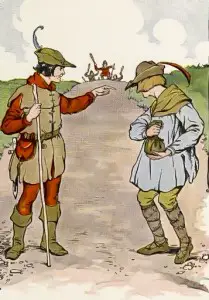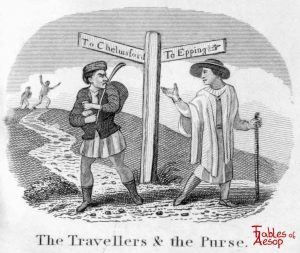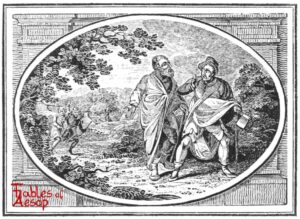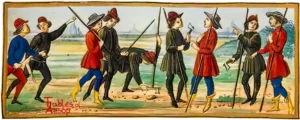One of two Men found an Axe. The other claimed part of the find until the owner showed up to take the Axe back. The other quickly withdrew the claim.
He who shares the danger ought to share the prize.

Aesop For Children (The Travelers and The Purse)
Two men were traveling in company along the road when one of them picked up a well-filled purse.
“How lucky I am!” he said. “I have found a purse. Judging by its weight it must be full of gold.”
“Do not say ‘I have found a purse,'” said his companion. “Say rather ‘we have found a purse’ and ‘how lucky we are.’ Travelers ought to share alike the fortunes or misfortunes of the road.”
“No, no,” replied the other angrily. “I found it and I am going to keep it.”
Just then they heard a shout of “Stop, thief!” and looking around, saw a mob of people armed with clubs coming down the road.
The man who had found the purse fell into a panic.
“We are lost if they find the purse on us,” he cried.
“No, no,” replied the other, “You would not say ‘we’ before, so now stick to your ‘I’. Say ‘I am lost.'”
Moral
We cannot expect any one to share our misfortunes unless we are willing to share our good fortune also.

Townsend version
Two men were journeying together. One of them picked up an axe that lay upon the path, and said, “I have found an axe.” “Nay, my friend,” replied the other, “do not say ‘I,’ but ‘We’ have found an axe.” They had not gone far before they saw the owner of the axe pursuing them, and he who had picked up the axe said, “We are undone.” “Nay,” replied the other, “keep to your first mode of speech, my friend; what you thought right then, think right now. Say ‘I,’ not ‘We’ are undone.”
Moral
He who shares the danger ought to share the prize.

Jefferys Taylor (The Travelers and The Purse)
Two friends once were walking in sociable chat,
When a purse one espied on the ground;
“O see!” said he (“thank my good fortune for that),
What a large sum of money I’ve found!”
“Nay, do not say I,” said his friend, “for you know
‘Tis but friendship to share it with me;”
“I share it with you,” cried the other, “How so?
He who found it the owner should be.”
“Be it so,” said his friend, “but what sound do I hear”
‘Stop thief!’ one is calling to you;
He comes with a constable close in the rear!”
Said the other, “Oh! what shall we do!”
“Nay, do not say we,” said his friend, “for you know
You claim’d the sole right to the prize;
And since all the money was taken by you,
With you the dishonesty lies.”
When people are selfish, dishonest, and mean,
Their nature, in dealing, will quickly be seen.
If the business in question be pleasure or profit,
Then each thinks of course he should have the whole of it;
But if it should happen ’tis danger or toil,
Then indeed they will vote for dividing the spoil.

JBR Collection (The Two Travellers)
As two Men were travelling through a wood, one of them took up an axe which he saw lying upon the ground. “Look here,” said he to his companion, “I have found an axe.” “Don’t say ‘I have found it,'” says the other, “but ‘We have found it.’ As we are companions, we ought to share it between us.” The first would not, however, consent. They had not gone far, when they heard the owner of the axe calling after them in a great passion. “We are in for it!” said he who had the axe. “Nay,” answered the other, “say, ‘I’m in for it!’–not We. You would not let me share the prize, and I am not going to share the danger.”

Samuel Croxall (The Travellers)
TWO men travelling upon the road, one of them saw an axe lying upon the ground, where somebody hud been hewing timber: so taking it up, says he, I have found an axe. Do not say I, says the other, but we have found; for, as we are companions, we ought to share it betwixt us; but the first would not consent. However, they had not gone far, before the owner of the axe, hearing what was become of it, pursued them with a warrant; which, when the fellow that had it, perceived, Alas! says he to his companion, we are undone. Nay, says the other, do not say we, but I am undone; for, as you would not let me share the prize, neither will I share the danger with you.
THE APPLICATION
This fable hints to us the conveniency, if not the necessity, of making our friendships firm and lasting. And to this purpose, nothing is so requisite as a strict observance of the rules of honour and generosity; for the very life and soul of friendship subsists upon mutual benevolence, upon conferring and receiving obligations on either hand. A stingy, reserved behaviour starves it; it ought to be open, free, and communicative, without the least tincture of suspicion or distrust. For jealousy, in friendship, is a certain indication of a false heart, though in love it may be a distinguishing mark of a true one. Nor is there any thing merely chimerical or romantic in this notion; for, if we examine, we shall find, that reason will confirm the truth, and experience evince the utility of it. He that hopes for assistance, or accommodation in any exigency or time of misfortune, must lay in a provision for it, by watchjng the necessities of his acquaintance, and relieving the most deserving of them in their straits, by a ready and a willing contribution. By this means, gratitude, which is never wanting to an honest mind, will secure us a reasonable fund in reversion; and all the favours we bestow will, like the tide of a river, in due season, flow back again upon us.

Thomas Bewick (The Two Travellers)
Two Men travelling upon the road, one of them saw an Axe lying upon the ground, where somebody had been hewing timber: so taking it up, says he, I have found an Axe. Do not say I, says the other, but we have found; for as we are companions, we ought to share the value between us: but the first would not consent. They had not gone far, before the owner of the Axe, hearing what was become of it, pursued them with a warrant; which, when the fellow that had it, perceived, Alas! says he to his companion, we are undone. Nay, says the other, do not say we, but I am undone: for, as you would not let me share the prize, neither will I share the danger with you.
APPLICATION.
We cannot reasonably expect those to bear a part in our ill-fortune, whom we never permitted to share in our prosperity; and whoever is so over-selfish and narrow-minded, as to exclude his friend from a portion of the benefits to which an intimate connection entitles him, may, perhaps, engross some petty advantages to himself, but he must lay his account on being left to do as well as he can for himself in times of difficulty and distress. The very life and soul of friendship subsist upon mutual benevolence, and in conferring and receiving obligations on either hand, with a free, open, and unreserved behaviour, without the least tincture of jealousy, suspicion, or distrust, guided by a strict observance of the rules of honour and generosity; and as no man includes within himself every thing necessary for his security, defence, preservation, and support, these rules are the requisites of friendship, to make it firm and lasting, and the foundation on which it must be built.
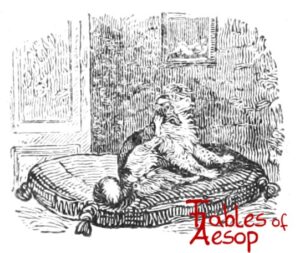

L’Estrange version (Two Travellers and A Bag of Money)
As two travellers were upon the way together, one of ’em stoops, and takes up something. Look ye here (says he) I have found a bag of money. No, says t’other, when two friends are together, you must not say [I] have found it, but [we] have found it. The word was no sooner out, but immediately comes a hue and cry after a gang of thieves that had taken a purse upon the road. Lord! brother (says he that had the bag) we shall be utterly undone. Oh phy, says t’other, you must not say [we] shall be undone, but [I] shall be undone; for if I’m to have no part in the finding, you must not think I’ll go halves in the hanging.
Moral
They that will enter into leagues and partnerships, must take the good and the bad one with another.

Gherardo Image from 1480

Viatores Duo et Bipennis
Duo una iter faciebant; horum unus repertam bipennem sustulit. Tum alter hortabatur, ne sic loqueretur ut diceret, ‘Ego bipennem inveni,’ sed sic, ‘Nos invenimus.’ Hoc ei, qui sustulerat bipennem, non persuadebatur. Mox visis quibusdam, qui se insequerentur cum clamore et concitato cursu, esse eos qui amisissent bipennem coniiciens, “Periimus,” inquit. At alter “Dices,” inquit, “nunc quoque ‘perii,’ non ‘periimus’ – quippe cum ‘invenimus’ nolueris dicere, sed ‘inveni.’”
Perry #067
